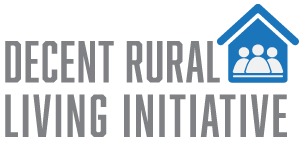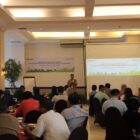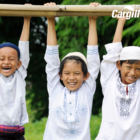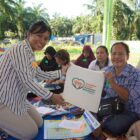The sun is still a few hours from rising over Kalimantan, the Indonesian portion of Borneo island. Under a black-ink sky studded with stars, Cargill Environment, Health & Safety understudy Meta Simangunsong and safety advisor Alicia Thomas climb into their car. They’re heading to a safety huddle known as the “morning muster” at one of Cargill’s PT Harapan palm oil plantation estates.
“Alicia, helmet?” Meta asks her colleague in the sort of shorthand partners use. Alicia confirms from the front seat that she’s carrying it. As the driver revs the engine, Meta gently urges another passenger to fasten their seatbelt.
Soon, at a crossroads of red mud and red dust, headlights bleaching the fern-draped trunks of surrounding oil palms, the driver brakes before making a turn, failing to come to a complete standstill despite a stop sign positioned on the corner. “Pak, you have to stop!” Meta reminds the driver, referring to him using a respectful Indonesian honorific.
Ever-alert Meta and Alicia live and breathe their safety roles at Harapan, a more than 32,000-hectare plantation employing more than 5,800 workers. The aim is that through a safety mentorship program that brought Alicia here from the United States in May 2016, this enthusiasm will be reflected in a reduction in safety incidents and fatalities across this remote, sprawling location. Alicia came from the Cargill Agricultural Supply Chain business in Minneapolis, and has been mentoring both Meta and another employee, Wibowo Kasman.
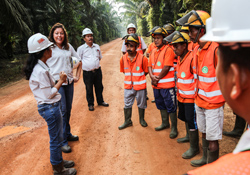
Partly due to the nature of palm oil harvesting, Cargill Tropical Palm has historically had a relatively higher number of significant injuries and fatalities than other businesses. Two years ago, management came together determined to turn this around in a drastic but structured approach. The result was the Achieve Zero Transformation Strategy, which supports Cargill’s overall push toward achieving zero fatalities. As a part of this, Alicia’s safety advisor position and two others were created across the three Cargill palm plantations. The other two safety advisors, Ruben Amat and James Deberg, have since completed their assignments and returned to their homes in Spain and Minneapolis, respectively.
“With this program, we have the opportunity to tap into the experience of experts from across Cargill to improve the safety of our plantations,” said Richard Low, chief executive officer of Cargill Tropical Palm. “It’s about knowledge-sharing, relationships and building a strong safety culture.”
The mentoring program is designed to help build safety competencies among local leaders, using one-on-one and small group mentoring to create a shift in how employees at the plantations think about the safety of their work. The program is designed to help leaders better understand how Cargill’s systems and processes can be improved to make work safer and more reliable for its people.
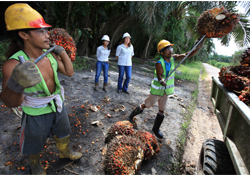
“Before, we would drive around the locations, and we would see people taking an unsafe position while harvesting, like standing too close to the trees, or doing something else unsafe or against standard operating procedures. For people here it was just normal; their focus was on harvesting, not necessarily safe harvesting,” says Alicia. “It’s not in the Indonesian culture to correct someone else. So we’re trying to reinforce that intervention is a good thing, and that keeping someone safe demonstrates respect and caring for each other.”
As morning muster gets underway, it’s clear Alicia and Meta have been working hard on finding a path forward.
Starting the conversation
The muster takes place in a field entirely surrounded by oil palms, their spiky fronds erupting from trunks almost like voluminous fountains of water. Safety posters translated into Indonesian skirt one side, advising workers about rules they should follow during the labor-intensive harvesting of the oil palm’s bunches, heavy with edible oil-rich, red-yellow fruit.
The sky morphs to indigo as Alicia and Meta join dozens of white-helmeted assistants for their daily briefing and discussion. The assistants cascade the information they have received to their yellow-helmeted harvesting team before work begins. “We want to ensure that there is a safety message relayed each day. Today’s message included a reminder about intervention: ‘See, say, stop, save a life,’” Alicia says.
Then, as the workers clamber into trucks and tractors to get to the fields— Cargill Tropical Palm will phase out motorcycle use by the end of the 2019 fiscal year—the eagle-eyed pair simply observe, looking for issues or gaps that will spark a later conversation and education opportunity. Seatbelts, for instance, might be eschewed by workers.
“I’ll talk to them about that. Is there an issue with the equipment? I’ll inspect the seatbelts to see their condition. Maybe there are pieces missing,” Alicia says. “Then I’ll talk about how assistants are conversing with employees about wearing seatbelts. Are they speaking about the risk and why it’s important?” It may sound like a simple approach, she adds, but the objective is to get employees to think beyond what they are supposed to do and truly understand why Cargill is asking them to do it.
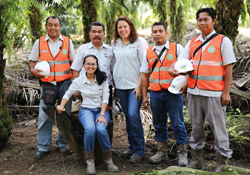
Alicia and Meta may also check that the workers are wearing their personal protective equipment and that it is in good condition. Educating on protective gear is an important aspect of the program, given that four Harapan employees experienced eye injuries last fiscal year from falling fruit and debris while harvesting.
“If we see people going out and they don’t have visors or the visors they have are in a bad condition, then we have a problem with our system,” Alicia says. “Something has failed. How have we let that happen? What do we need to focus on to drive improvement?”
The ferocious tropical sun starts its arc across the blue sky as Alicia and Meta traverse the plantation. Twenty-five-year-old Meta used to be a field assistant on a Harapan estate, but now she’s focused on engaging in conversations with the harvesters after observing their work.
These discussions are a genuine life or death matter. In June of this year, a worker named Pak Maga was killed when his harvesting sickle fell toward him, severing a major artery in his leg. It was the second such fatal injury to occur in a few years’ time.
“Making palm harvesting safer is a critical focus for us,” said Al Johnson, vice president of Cargill Environment, Health & Safety. “Just because the industry does something one way, doesn’t mean we have to. In many cases, we have to change how we work today to make step- change improvements in safety. This is true all across Cargill and at our plantations, we have to find innovative ways to make harvesting safer, period.”
As Meta and Alicia make their way around the estate, they talk with workers who are manually loading fresh fruit bunches into tractors, then with three women who are spreading fertilizer around the palms.
Against a soundtrack of loudly buzzing cicadas, Alicia asks the women questions, with Meta translating. “If the mask is difficult to breathe through, or is wet or clogged, will you still wear it?” she asks. “If not, what could happen?”
The three workers give their answers, while Meta uses this opportunity to share lessons learned from an incident that occurred at another plantation from exposure to chemicals, reminding the women why it’s important to wear their personal protective equipment to keep themselves safe.
“We spend a lot of time looking at how we are doing the job compared to how we should be doing the job,” says Alicia. “This helps us find gaps in our ability to perform a job safely every time.”
Cargill also is demonstrating leadership in the industry, says Nharong Somchit, president director of Harapan, by seeking to set up a mechanism by which industry players can sit down together to share safety-related experiences. “Whether formally or informally, we are known as leaders in safety. We are trying to use that influence to talk about how we improve safety across the palm industry”
Making safety ‘who we are’
For Meta, moving to Cargill’s Environment, Health & Safety team has been a major learning experience, but it’s not the first time she’s challenged herself within the business. Armed with a degree in agronomy, the North Sumatran woman completed Cargill’s estate training program and was then assigned to an estate in the west region of Harapan.
What she’s learned since moving to her new role is not just the importance of theory, but how to implement it in practice. “Before, I was just thinking about production, but not really thinking about how I could influence the safety of my employees. I now have better knowledge of how to approach people in a different way when it comes to safety.”
This is the part of the job she likes best. “It’s the communication with the employees about safety that I enjoy. Talking to the employees, asking them for feedback, discussing with them what it means to be safe. How can we go back home safely to our families every day?”
Alicia says Meta has greater confidence now to walk up to workers to advise them on health and safety matters independently. “Before she might have thought, if he’s not my employee, is it really my place to say something to him? Now she understands that talking to someone about safety isn’t about crossing a boundary. It’s about educating people and engaging them in a conversation. She’s definitely willing to do that.”
Harapan, which was acquired by Cargill in 2005, isn’t as remote as it used to be, but it’s still an approximately 3.5-hour drive along graded, mostly dirt roads from the nearest airport. Only a few years ago, Cargill had to fly a plane full of cash to its own airstrip in order to pay its workers; these days a bank is on location. Still, in order to attract and retain employees, Cargill operates almost like a proxy civic authority, providing homes, schools, health clinics and even places of worship.
For Alicia, the distance of Harapan from her former Minneapolis location was part of the job’s allure. “Come on, it’s Indonesia!” she says when asked why she took the job. “I really like challenges and I knew this would be a challenge. But I also wanted to see how safety really was here and what I could offer the team.”
She recalls looking at incident reports from Cargill Tropical Palm years ago that listed, for example, somebody getting cut with a machete, or being bitten by a snake. “These types of incidents were so different from my work in a soybean processing facility—I wanted to experience this environment myself.”
Alicia has seen some noticeable differences in a single year, especially in regards to vehicle safety and the development of a culture of intervention. “It’s becoming more of who we are,” she says.
The changes since Alicia arrived have been gradual, and sometimes difficult to see, as Harapan comprises so many locations spread across such a vast area. But she is heartened when she finds people unloading fertilizer a newer, safer way, or inspecting their protective gear correctly, and most importantly when they can explain to her why.
“Then you’re like, wow. It does work,” she says. “You can see the impact of spending time talking, and educating, in small groups.” It’s also given her an awareness of the real challenges in the more remote parts of Cargill. “Once you’re here, you’re like: Ah, it’s not that simple to just say, ‘Use fall protection!’ ”
Ultimately, the goal is to have employees initiating conversations about safety themselves. This will be Alicia’s focus going forward as she moves into a new role coaching three leaders from Poliplant, Cargill’s other Kalimantan plantation, and three from Harapan on safety leadership. She’ll seek feedback on how they’re viewed as safety leaders by other employees, and help them create development plans to strengthen their skills. It’s an essential next step, she says, “Because research shows that what leaders say and do matters in terms of creating a safety culture.”
Impactful change
At River View mill, one of three dotted across Harapan, freshly processed oil palm kernels infuse the air with a scent reminiscent of warmed coconut oil. Mill visits are another routine part of Alicia’s job. Alongside the mill manager, she checks permits and identifies risks. Then together, Alicia and the mill manager discuss potential ways to mitigate those risks.
Frequent visits from Alicia have helped break down jobs into safer components, mill manager Alhudi Azidin says. “When she came here I asked her: Please, help me to create a new work environment that’s safer. Together, we have implemented systems and controls that are making a big difference.”
You can easily drive for half an hour or more within Harapan without seeing a single worker, the distances are so vast. But as Alicia and Meta head back to the office from the mill, one worker happens to be fruit harvesting near the road.
“We have a guy and he’s wearing his visor!” Alicia exclaims. “This is exciting. At least, it is for me!”
It’s just another small window into the change that Alicia and her understudies are helping bring about.
“I hope that there are some people here that I have impacted in a positive way,” Alicia says. “I hope they truly understand that Cargill values our people, and that’s why we have this focus on safety.”
Original blog by Cargill
https://www.cargill.com/story/on-the-ground-in-indonesia-with-a-cargill-safety-advisor-and-her
